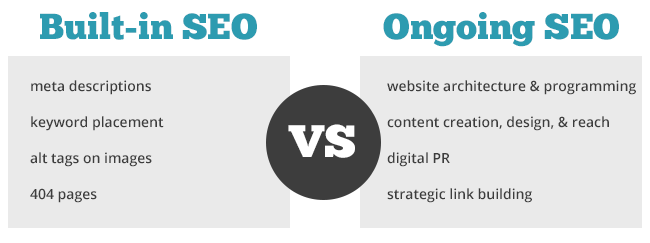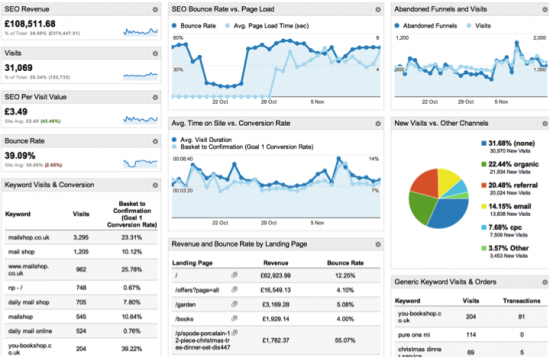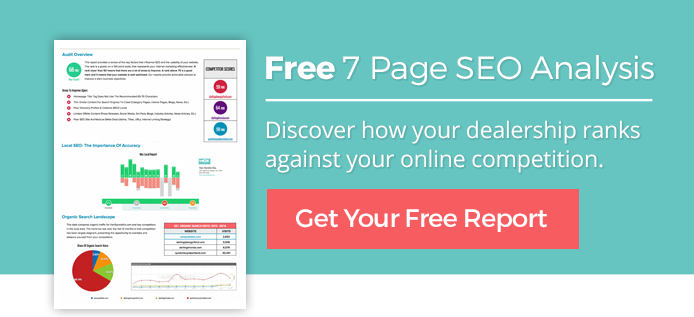5 Things You’re Wrong About When It Comes To Auto Dealer SEO
In the ever-changing landscape of Search Engine Optimization, strategies quickly become outdated and SEO’s true impact on auto dealer websites remains a hot topic for discussion. Depending on who you ask, you may hear that SEO is an absolutely essential part of any business’ marketing plan. Ask someone else, and they’ll tell you it is smoke and mirrors, a dying tactic that adds nothing to the bottom line. So who has it right?
In this article, we’ll address the most common myths, misconceptions and opinions surrounding the modern auto dealer SEO landscape. Our goal is to bring the picture of why SEO is more important than ever into focus while shedding light on the massive changes the industry is experiencing.

Myth #1: SEO is dead
Plain and simple: as long as there are search engines, SEO will never die. Search is how people access information, make purchasing decisions, and learn about the world around them, from local restaurant menus to getting their car serviced.
Let’s be clear on this fact: SEO in the sense of keyword stuffing, building irrelevant links to your site, and essentially trying to game or outsmart Google IS dead. In fact, if you are engaging in any of those practices, your online search presence is practically nonexistent.
Search is moving in a holistic direction, meaning effective SEO strategy is now centered around building a complete brand image for searchers while simultaneously sending meaningful signals – social, content, location – to your users.
The goal of an effective SEO strategy in the current landscape is three pronged:
- Create an informative experience for people (your customers!)
- Enable your customers to locate you effectively, be that through your website, Google My Business (Maps), Facebook, Foursquare and other important directories
- Encourage your customers to communicate with you directly through social channels, as these engagement signals are becoming more important with every algorithm update
When you create this experience for your customers, you create a direct path to success in both visibility and new business.
Myth #2: My website came with SEO built in, so I’m all good
This is a glaring misconception about SEO. One of the reasons it’s so prevalent is many web design firms use this notion of “baked-in SEO” as a selling point for their web design services.
Sure, while a web design firm may build a beautiful website with “SEO elements” in place, it will never equate to an effective, ongoing SEO strategy.

Auto dealer SEO is not a one-and-done operation. It is an ongoing, evolutionary process that continually builds equity in your website and brand. Yes, having a website with the built-in fundamentals of SEO is important, but that’s just the first step towards optimization. The rate at which search engines update their algorithms warrants having an expert in your corner to make sure that the SEO on your site conforms to today’s best practices.
Ongoing web updates, like adding new blog articles, landing pages, and creating an effective user experience, ensure that your site is user-friendly and is technically compliant with what the search engines like to see.
- Where am I ranking in search?
- Where is my competition ranking?
- What do I look like in search?
- Is my brand message clear?
- What is my ongoing SEO strategy?
Myth #3: There’s no ROI in SEO
“Show me the money!”
Though it may be an overused phrase, it’s also the most basic validation of any successful marketing campaign – positive ROI. There is a looming misconception that there is no way to determine ROI from SEO, but there is.
In the short term, driving ROI from SEO is not realistic. In the first 90 days of an SEO campaign, you typically won’t see a significant return. But in the long run, with ongoing optimization, you can derive both a measurable and correlative ROI that directly impacts your bottom line.
Click to Tweet
The first thing to keep in mind is you are building equity in your website and your brand. Continuing to invest in your website is always a smart move because it positions you for longevity.
Once you become an authority in your vertical, it’s very difficult to be dethroned. So, investing in an ongoing SEO strategy and working towards the top of the SERP (Search Engine Result Pages) can provide years of visibility and profit-driving traffic to your site.
The second thing to remember is that you can utilize metric-driven goals in Google Analytics to determine campaign success. Form submissions, click-to-call conversions, behavior funneling to product pages – all of these conversion goals can be tracked and reported, which can illustrate a direct ROI.
One can also compare more general business metrics to determine a correlative ROI based on how performance has increased over time.

Get yours by going here.
Lastly, SEO is a very important component of any successful integrated marketing mix. If you are investing in traditional, offline marketing or advertising but neglecting SEO, your dealership will become a tripod with a missing leg.
Learn more about integrated marketing here: Dealership Integrated Marketing 101: Rethink Automotive Advertising
Successful SEO reaffirms brand consistency and credibility. For example, if potential customers search online after seeing a print ad and discover a poor search engine presence, that person will be less likely to contact your business.
Myth #4: More backlinks are all that matter for SEO
Many people believe that SEO rankings are heavily reliant on the amount of backlinks (links pointing to your website from other sites) you have. This leads people to pay for huge quantities of links from random domains with the goal of driving up their total backlink count.
This tactic is outdated and dangerous, as Google’s Penguin algorithm update has blatantly targeted multiple sites engaging in unnatural link tactics. Amassing links, especially from sites that have no relevance to your business, is a surefire way to be penalized by the search engines and fall to complete obscurity in Google.
The best practice now is quality over quantity: utilizing strategic content marketing and natural linking to achieve meaningful links to your domain. By doing this naturally and steadily over time, you will build authority for your site the same way word of mouth builds authority for a business. Google will quickly realize that if people are willing to share and link to your content out of free will, you must have some great content that benefits your users.
There is a perception among many business owners that their website gaining the first organic ranking position in search is the ultimate goal. While that is a great goal to work toward, it’s also a very narrow strategy to pursue.
Click to Tweet
When a potential customer seeks information, he or she will likely use multiple search phrases and consider information from many online sources.
Therefore, Search Experience Optimization (SEO) is about developing a consistent brand presence within the major search engines, through the ongoing optimization of your website, along with directory listings, review sites, and social media.
Myth #5: I write my own blog articles, so I don’t need help with content development
First off, if you are regularly contributing to your onsite blog – BRAVO! You deserve to be applauded for doing one of the best possible things you can do to help your site’s SEO performance. That said, there could still be gaps in your blogging and content development strategy.
It’s important to remember that blogs are only one piece of the content puzzle. Content comes in all forms, from image overlays and new landing pages to image alt text and page title tags.
When you have an SEO professional guiding your efforts, you can create a strategic content strategy that will improve your search engine presence.
- For blogging, it may be doing research on Google Trends for your industry and piggybacking on a topic that has some volume and relevance
- For creating landing pages, it means identifying a key phrase you want to rank for and then building a page thoroughly around that key phrase to increase the likelihood of that page ranking highly and sending valuable traffic to your site.
- For social messaging, content creation can revolve around brand voice and identity, which unifies your online presence and creates true brand synergy.
Enjoy this article? Subscribe to our blog to receive our latest articles, tips for your dealership, and more.


